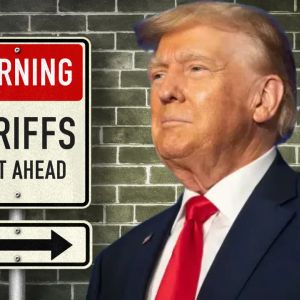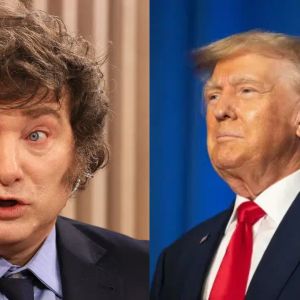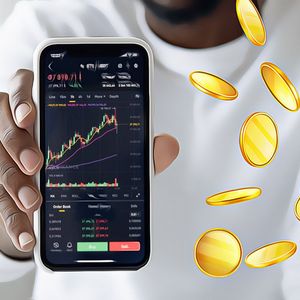Donald Trump wants tariffs. The European Union (EU) wants payback. The European Commission President, Ursula von der Leyen, said Friday that the bloc will retaliate immediately if the United States imposes global reciprocal tariffs. Trump set an April 1 deadline to finalize the plan, claiming European trade policies, like the value-added tax (VAT), give European businesses an unfair advantage. Von der Leyen made her position clear: “The EU will react firmly and immediately against unjustified barriers to free and fair trade, including when tariffs are used to challenge legal and non-discriminatory policies.” She didn’t stop there. “Tariffs are taxes,” she said . “By imposing tariffs, the US is taxing its own citizens, raising costs for business, stifling growth, and fueling inflation.” The EU has been trying—unsuccessfully—to reach Trump’s administration. Von der Leyen had a brief meeting with Vice President JD Vance in Paris earlier this week. The EU’s trade chief, Maros Sefcovic, had an opening call with Trump’s economic team, but no real progress has been made. Meanwhile, Trump isn’t backing down. On Thursday, he announced that he would expand tariffs beyond the reciprocal ones, specifically targeting cars, semiconductors, and pharmaceuticals. Trump warns BRICS: “100% tariff” if they challenge the dollar Trump is not just focused on Europe. Speaking to reporters ahead of a meeting with Indian Prime Minister Narendra Modi yesterday, Trump repeated another warning—this time to BRICS, the economic bloc made up of Brazil, Russia, India, China, and South Africa. He declared, “BRICS is dead.” His reasoning? Tariffs. Trump claims that his previous tariff threats stopped BRICS from creating a common currency to rival the US dollar. “If they want to play games with the dollar, they’re going to be hit with a 100% tariff,” Trump said. The BRICS nations, however, deny they ever planned to launch a single currency. Russian Kremlin spokesperson Dmitry Peskov said in January that “talks on a common currency have not taken place and are not taking place now.” Instead, BRICS countries are focusing on trading in their local currencies to reduce their reliance on the US dollar. Brazil, which currently leads BRICS, also won’t push for a common currency, according to government officials cited by Reuters on Thursday. Instead, the group’s focus is on making international payments in alternative currencies easier. Trump moves to reshape global trade with new tariff strategy Trump isn’t stopping with Europe or BRICS. He’s expanding his trade war with a full-scale review of tariffs, country by country. Commerce Secretary Howard Lutnick announced that the Trump administration is reviewing trade policies across the globe, including import duties, subsidies, intellectual property enforcement, and VAT rules. The results of this review will be finalized by April 1. Since taking office in January, Trump has already increased tariffs on Chinese goods by 10% and raised steel and aluminum tariffs to 25%. Now, he’s setting his sights on the auto industry, semiconductors, and pharmaceuticals, saying he will impose tariffs “over and above” the global reciprocal ones. Europe struggles to reach Trump’s white house Brussels has been locked out of real discussions with Trump’s administration. Von der Leyen’s brief meeting with Vice President JD Vance in Paris yielded no breakthroughs. Trade chief Maros Sefcovic’s call with Trump’s economic team was little more than a formality. Meanwhile, Vance is making headlines for his stance on Europe. Speaking at the Munich Security Conference, he made it clear that he sees internal European politics as a bigger threat than Russia or China. “The threat that I worry the most about vis-à-vis Europe is not Russia, it’s not China, it’s not any other external actor,” Vance said. “It’s the threat from within.” His comments took direct aim at European leadership, criticizing their handling of elections, free speech, and democratic policies. He pointed to the cancellation of an election in Romania, the prosecution of an anti-abortion protester in the UK, and the banning of extremist German politicians from the event itself. “If you are running in fear of your own voters, there is nothing America can do for you,” he said. European leaders sat stone-faced as he spoke. Trump blindsides Europe with Putin call on Ukraine Europe isn’t just worried about trade. Trump’s recent phone call with Vladimir Putin has left NATO allies on edge. The US president told Putin he was open to negotiating an end to the war in Ukraine—without involving Ukraine or European allies. European leaders were caught off guard. “It’s clear that any deal behind our backs will not work,” said EU foreign policy chief Kaja Kallas during a NATO meeting in Brussels on Thursday. She warned that Trump’s approach could undermine the West’s entire strategy in Ukraine. The market reaction was instant. Russian stocks surged. European defense stocks dropped. The message was clear—investors see Trump giving Putin the advantage. European leaders aren’t holding back their criticism. Estonian Defense Minister Hanno Pevkur said, “Any deal struck without Europe will not be long-lasting.” UK Defense Secretary John Healey added, “There can be no negotiation about Ukraine without Ukraine, and Ukraine’s voice must be at the heart of any talks.” Meanwhile, US Defense Secretary Pete Hegseth briefed NATO allies on Wednesday, saying the US won’t send troops to enforce a peace deal. He also said Ukraine’s NATO membership is unrealistic and that Kyiv may have to accept territorial losses. Global economic fragmentation is threatening growth and financial stability The world’s economic system is falling apart, and it’s putting growth and financial stability at serious risk, according to Klaas Knot. The Dutch central bank chief and chair of the Financial Stability Board didn’t hold back in his speech on Friday, calling on governments and financial institutions to keep working together before things get worse. “The progress we’ve made in global economic and financial cooperation since World War II is under serious pressure,” Knot said. “Geopolitical tensions are rising, countries are protecting their industries, they’re slapping trade restrictions on each other, and it’s getting harder and harder to agree on shared priorities.” Knot, who also sits on the European Central Bank’s Governing Council, said this economic divide isn’t just bad for international relations—it’s hurting the entire financial system. “This isn’t good news for the world economy,” he said. “It’s disrupting the way global financial rules are supposed to work.” Global institutions must step up or pay the price Despite the political and economic fractures, Knot insists that governments, central banks, and academics need to stay connected. “We have to stay as engaged as possible,” he said. Institutions like the International Monetary Fund (IMF) and the World Bank can’t ignore the global tensions, but that doesn’t mean they should sit back and watch. “International tensions are a fact of life—we can’t change that,” Knot said. “But that doesn’t mean we should just do nothing.” He stressed that cooperation is more critical than ever, warning that failing to act could have serious economic consequences. “If we don’t work together, this could get very expensive,” Knot warned in his speech at Nyenrode Business University in the Netherlands. “The biggest threats to financial stability today don’t stop at national borders. The only way to fix them is by working together.” Cryptopolitan Academy: Are You Making These Web3 Resume Mistakes? - Find Out Here



















